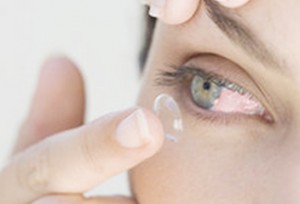 Wearing Contact Lenses are very convenient for multiple reasons. In addition to improving vision, contacts are ideal when it comes to playing sports. Off course, when it comes to wearing them in the monsoons, contacts are much more enjoyable than glasses can ever be! Nevertheless, it is important to note that a contact lens is a medical device that needs a high degree of care.
Wearing Contact Lenses are very convenient for multiple reasons. In addition to improving vision, contacts are ideal when it comes to playing sports. Off course, when it comes to wearing them in the monsoons, contacts are much more enjoyable than glasses can ever be! Nevertheless, it is important to note that a contact lens is a medical device that needs a high degree of care.
When you are initially fitted with contact lenses, your eye specialist will teach you the proper technique of cleaning your contact lens. First clean and rinse, then disinfect. Most of the infections related to contact lenses are due to poor habits or lens hygiene.
Daily disposable contact lenses are meant to be discarded after every use. Hence, they require no cleaning. However, while using other types of lenses, a regular cleaning schedule needs to be maintained to prevent infections.
Contact Lenses may cause the following eye problems:
Keratitis (an inflammation of the outer layer of the eye, the cornea) is the most common type of contact lens infection. Thiscan be caused by fungus or bacteria from an unclean lens or amoeba from tap water; or by injury to the cornea (commonly, a scratch by your finger nail while removing or putting in your lenses).
A Corneal Ulcer is a sore in the outer transparent layer of the eye called the cornea. Though not very common, previously untreated corneal infections may lead to a corneal ulcer and is extremely serious.
Factors contributing to a contact lens infection are:
- Using extended-wear lenses,
- Decreased tear exchange under the lens,
- Sleeping with your contact lenses on,
- Poor hygiene and maintenance of the contact lens case, topping off or re-using contact lens solution
Tips to reduce contact lens infection:
- Regular eye checkup. You eye doctor will advise you for proper contact lens.
- Always handle contact lenses only after washing your hands. If your hands are unclean, bacteria can easily get onto your lenses.
- Clean contact lenses carefully and regularly with the lens care solution that has been recommended by your eye specialist. Never, ever re-use old lens solutions.
- Store contact lenses in its proper clean case. Replace your case every 3 months or as recommended by your eye specialist.
- Discuss with your eye specialist to know how frequently you should replace your lenses. For example, if you use daily disposable contacts, ensure that you discard them daily, to minimise your risk of infection.
- Never sleep with your contacts in. Even extended wear lenses carry a risk of complications, and it is best to remove them before you sleep.
- Avoid swimming, showering or bathing with your contacts in. If wearing lenses while swimming is absolutely necessary, wear goggles and remember to dispose / disinfect your lenses afterwards.
- See your eye specialist immediately if you notice eye pain, excessive tearing, sensitivity to light, blurred vision, redness, or the sensation of something in one’s eye while you are using contacts.
Don’t forget to ask yourself these three questions, every time you wear your lenses:
1) Do My Eyes Feel Good With My Lenses On? (No Discomfort)
2) Do My Eyes Look Good? (No Redness)
3) Do I See Well? (No unusual blurring with either eye)




